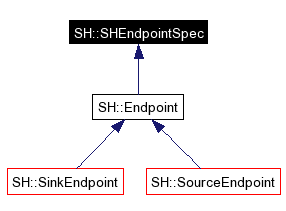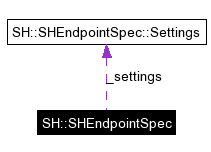
#include <SHEndpointSpec.h>
Inheritance diagram for SH::SHEndpointSpec:


Public Member Functions | |
| void | initSettings (const SHEndpointSpec::Settings &settings) |
| virtual bool | isSink () const |
| virtual bool | isSource () const |
| virtual bool | supportInterfacePull () const |
| virtual bool | supportInterfacePush () const |
| virtual bool | supportMultipleInstances () const |
| virtual bool | supportArbitraryInstances () const |
| virtual size_t | getMaxSupportedInstances () const |
| virtual bool | supportDynamicConnection () const |
| virtual bool | supportDynamicDisconnection () const |
The class EndpointSpec is an abstract base class that describes a stream handler's potential end points. A specific EndpointSpec is instantiated by the stream handler when it is requested by a caller, and the caller is responsible for deleting this spec. The spec is guaranteed to be correct at instantiation time; due to asynchronous behaviour of the caller, it may be invalid when the caller intends to make use of the contained information. The stream handlers must account for outdated specs used by a caller for subsequent operations.
|
|
Returns the number of instances of this kind of endpoint. Returns 0 if supportArbitraryInstances() is true. Returns 1 if supportMultipleInstances() is false. Otherwise, the number of supported endpoints, which may change between retrieval of this data and actual creation of an endpoint. Reimplemented in SH::RTPSourceEndpoint.
|
|
|
The settings list that is provided to the constructor as a parameter can ease the implementation for the simple stream handler endpoints that have relatively inflexible settings. |
|
|
True if this endpoint spec describes sink endpoints. False if it describes source endpoints. |
|
|
True if this endpoint spec describes source endpoints. False if it describes sink endpoints. |
|
|
True if the number of endpoints of this endpoint spec is not limited in any way. |
|
|
True if this kind of endpoint can be linked into stream graphs that are already active. Stream handlers' endpoints must support this feature if they are routing stream handlers in frequently changing graphs such as the RTP caching scenario. |
|
|
True if this kind of endpoint can be removed from stream graphs that are already active. |
|
|
True if this describes a source endpoint, which can operate in passive or through mode. |
|
|
True if this describes a sink endpoint, which can operate in passive or through mode. |
|
|
True if multiple endpoints of this endpoint spec can be instantiated by a single stream handler, e.g. in a multicast or filter stream handler, but also by the RTP stream handler, which may report new connections to the graph manager. |
 1.3.8
1.3.8